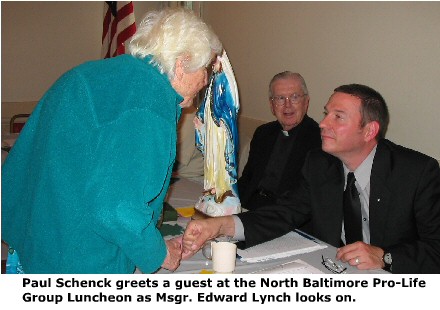|
Back to the October 2005 Newsletter Index STEM CELL, NAZI RESEARCH USE SAME JUSTIFICATIONSAdvocates of embryonic stem cell research are using the same moral arguments as those used by German doctors to justify their experiments on prisoners in Nazi concentration camps, says Paul Schenck. Moreover, in an eerie parallel, these moral arguments are being used not only to push for federal funding of embryonic stem cell research, but to advocate the current use of data from the old Nazi experiments, he said. Dr. Schenck, director of the National Pro-Life Action Center in Washington, D.C., in two talks September 29, described the center’s efforts to educate Congress on the moral evil of embryonic stem cell research (ESCR). With several bills allocating federal funding for ESCR pending on Capitol Hill, NLPAC held a symposium for Senate staff on the science and ethics of such research in June. A second such symposium was scheduled for October 13. “What I’m concerned about from an ethical and moral point of view is a matter that has been almost entirely ignored,” said Dr. Schenck in his September 29 talks. “That is, with the introduction of publicly funded, and therefore publicly approved, embryonic stem cell research, we are about to cross a line – and in some cases, have already done so – that was laid down at Nuremberg after World War II.” At the Nuremburg trials, twenty doctors were condemned because they conducted research on prisoners who were unable to give voluntary consent.
“At the trials, the doctors defended themselves by saying that these people were as good as dead anyway, and we thought we should get something good from them before they perished.” So they conducted terrible experiments, dropping people out of airplanes, submerging them in icy water, injecting them with material that caused excruciating pain. But we should not mistake the researchers’ actions as simply done out of a Satanic or sadistic interest in inflicting pain, warned Schenck. “The doctors testified that their objective was to learn how to preserve and protect the lives of German soldiers, and others as well. “They said, these people were going to die anyway in the gas chambers, so before they did, we thought it would be good to transform their miserable deaths into something helpful and productive for humanity. That was their defense.” After the Nazi experiments came to light, a broad and universal taboo was put into place on the use of this kind of research data, said Schenck. Yet, some scientists now in the academic community are challenging that taboo and calling for the data to be published and used. “Some have suggested that using this data would confer meaning on the victims’ otherwise meaningless deaths,” he noted. But he quoted Dr. Howard Spiro of Yale University’s Department of Internal Medicine, who said that no one honors the memory of the dead victims by learning from experiments carried out on them: instead, we become “retroactive partners” with the Nazis in the victims’ torture and death. Said Schenck, “I sat in the gallery of the U.S. House of Representatives and heard the argument used, almost verbatim, that the doctors had used in the Nazi death camps,” to advocate the use of ‘spare’ embryos, left over from in vitro fertilization, for research. But the Nazi experiments demonstrate that the reduction of human beings to means to an end, no matter how noble those ends may be, is intrinsically evil and can never be morally justified for any reason or under any circumstances, Schenck concluded. “The human embryo is just another stage of human development,” he said; “every single person debating the use of the human embryo in research is a former human embryo himself!” The stem cell research issue “has to be addressed and confronted straight on, and we intend to do it in the U.S. Senate,” he said. “We have a pledge from the President that he will veto any legislation funding embryonic stem cell research. “But the Senate leadership has vowed to override the President’s veto.” Many people are ambivalent about ESCR, Schenck conceded: “After all, we have these ‘spare’ embryos that are never going to be implanted. What should we do with them? “But the Church has said that if we use them, not only do we become complicit retroactively in the immoral acts that led to the creation of those human embryos, there’s another implied concern: if you make an exception for these embryos, we are encouraging the creation of more.” We can’t turn a blind eye to the invasion of the integrity and dignity of the human person, he insisted. “If we are allowed to designate some persons as fodder for scientific experiments, then virtually no one is safe.” Dr. Schenck’s first September 29 talk was at the North Baltimore Pro-Life Study Group’s annual luncheon in Lutherville. The second talk, sponsored by Defend Life, was at St. Catherine Laboure Church, Wheaton. |

 “What is generally not known is that the Nazis allowed private
researchers and physicians to rent space in the extermination
camps to perform deadly experiments on the internees. They
were not official Nazi doctors,” said Schenck.
“What is generally not known is that the Nazis allowed private
researchers and physicians to rent space in the extermination
camps to perform deadly experiments on the internees. They
were not official Nazi doctors,” said Schenck.